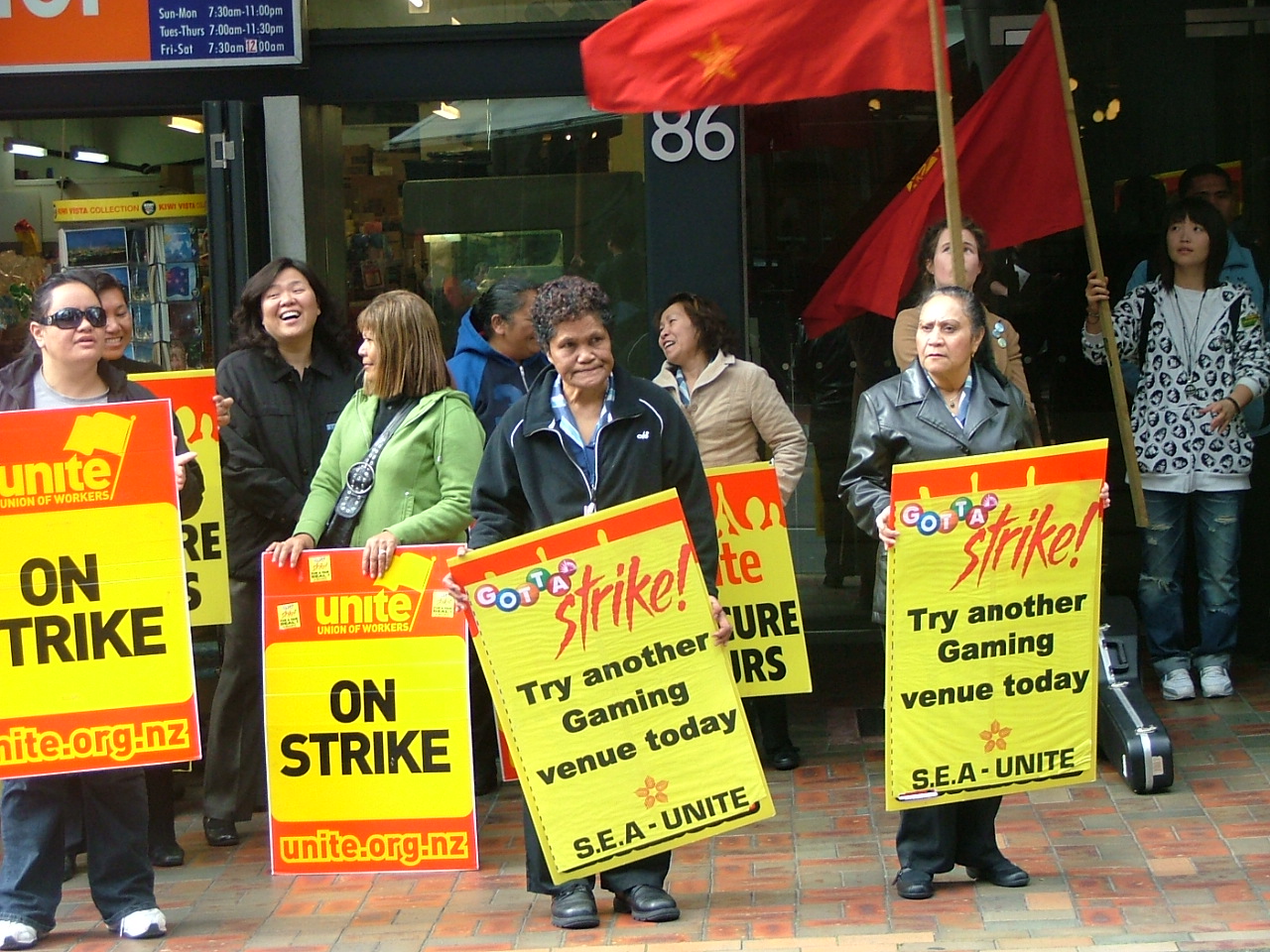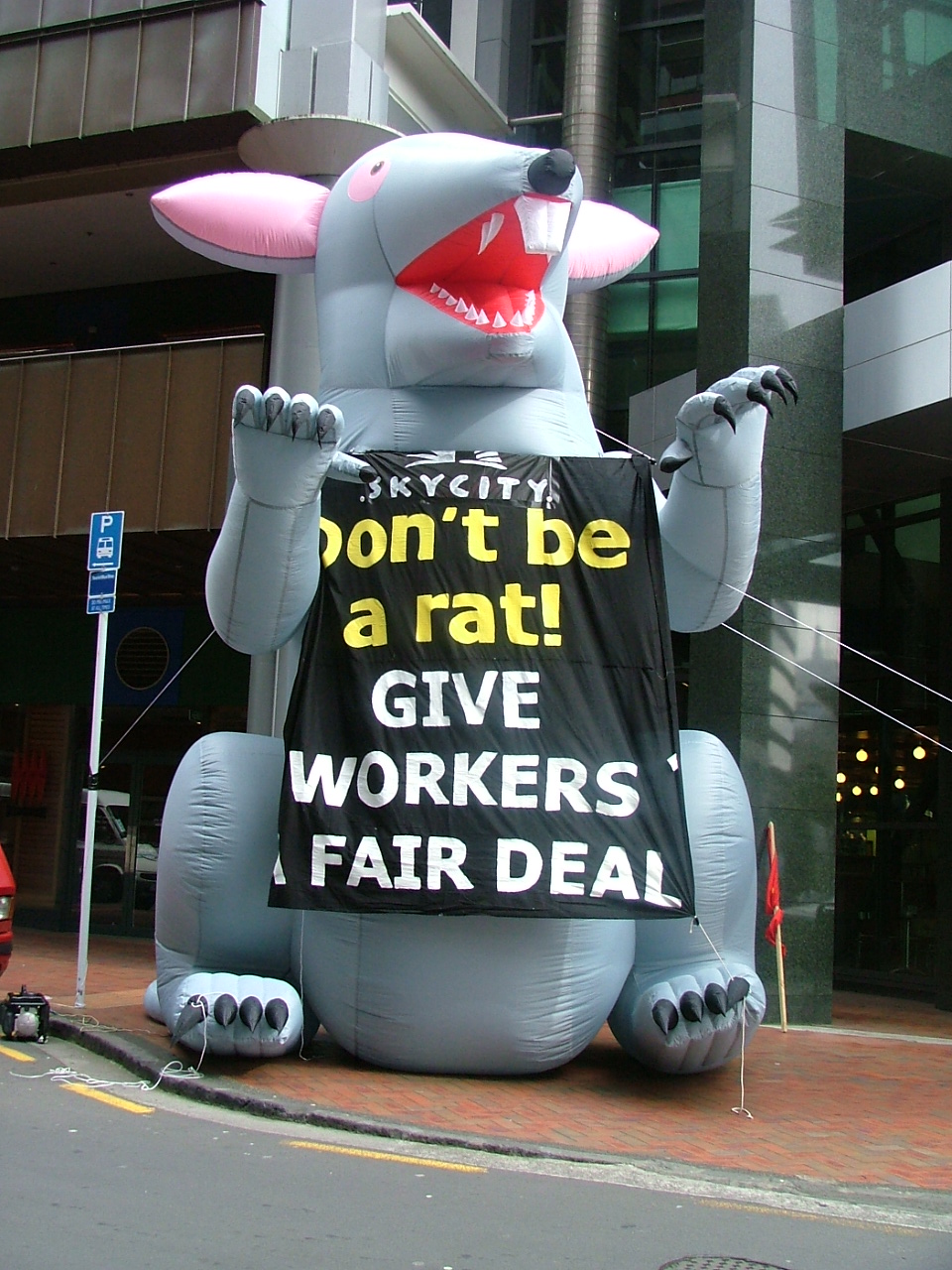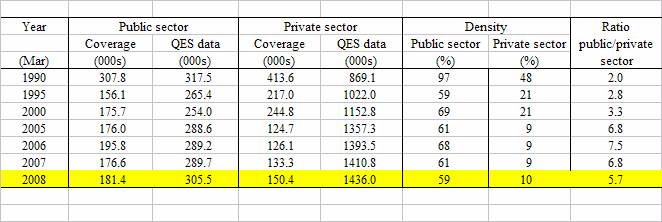
John Edmundson The Spark November 2010
Europe has seen a massive upsurge in worker resistance to planned implementation of continent-wide austerity measures. The size and militancy of the demonstrations and strikes should serve as an inspiration to workers in this part of the world, where class consciousness is at an all time low and union leadership has been sorely lacking and misdirected. In New Zealand, the CTU’s national day of action against the proposed extension to the 90 Day Act and other attacks on workers’ rights was morphed into a Labour Party election rally and Christchurch, where job losses due to earthquake related business closures, and earthquake recovery projects will mean workers there will be more exposed than most to the provisions of the 90 Day Act, the CTU decided in its wisdom that “for obvious reasons,” there would not even be a rally.
Compare this with the situation developing across Europe and the contrast could hardly be starker. The Spark has already given some coverage to the massive demonstrations that struck Greece, but huge worker rallies have taken place across many European cities and industrial action has hit several countries, most notable Spain and France. While it would be wrong to read too much into the potential of these actions, they do represent a significant positive development given the relative quiescence of the working class movement. Continue reading “Thousands across Europe resist austerity attacks”
STUDY: 1991 – the General Strike that Wasn't
Hosted by the Workers Party
Tuesday 10 August 2010 6pm-8pm Trades Hall 147 Great Nth Rd, Auckland
Reading: Peter Harris ctuand critical notes by Don Franks (WP) SOME RELECTIONS ON THE ECA INTRODUCTION
Tony Boraman: “The Myth of Passivity” http://libcom.org/files/The%20Myth%20of%20Passivity1.pdf
The need for a farm workers union
The Spark April 2010
Byron Clark 
Recently released figures from Federated Farmers have shown that although the number of farms with written contracts between the farmer and farm employees grew by 9% since last year, fewer than a quarter of farms have a contract with their employees and only 40% keep records of the hours their employees’ work. Continue reading “The need for a farm workers union”
Strike rights threatened
Mike Kay
A Private Member’s Bill introduced by the National Party MP Tau Henare has been drawn from the ballot to be debated in Parliament. The Bill proposes to amend the Employment Relations Act as follows:
“A strike may not proceed under this Act, unless the question has been submitted to a secret ballot of those employees who are members of the union that would become parties to the strike if it proceeded.”
The Council of Trade Unions has announced its “support in principle” for the bill, “as it largely reflects current practice.”
The British experience may be of some use in analysing the effect of secret ballots. Over there, the law has required a secret ballot prior to strike action for nearly 30 years. I asked an official with the Postal section of the Communication Workers Union his opinion on the issue. This is his response: Continue reading “Strike rights threatened”
MIGRANT WORKERS, THE ECONOMIC CRISIS AND THE UNIONS
Public Meeting: 7.30pm, Tuesday, April 7, Trades Hall. 147, Great North Rd, Grey Lynn AUCKLAND
Recently there have been decisions by companies to make NZ workers redundant while continuing to employ migrant workers on temporary visas. There have been calls by both the Labour Party, National and some unionists for these migrant workers to be laid off first. The immigration service has revoked the work visas of some workers who kept their jobs. Migrant advocates have raised concerns that racist sentiments are being fostered and ask the question why migrant workers shouldn’t have their rights protected. New Zealand-born or permanent residents ask why they should be sacked when temporary visa holders keep their jobs.
This raises questions on how unions should be approaching migrant workers when there may be conflicting claims for support from different groups of workers who are their members.
Addressing these questions will be speakers involved in the union movement and in advocating for migrant workers. These include:
– Laila Harre, National Secretary of the National Distribution Union
– Dennis Maga, Migrante Aotearoa
– John Minto, Organiser, Unite Union
– Mike Treen, Global Peace and Justice Auckland (Chair)
For more information contact Dennis Maga, 021 971 070 , dennis.maga@yahoo.co.nz
Will the Council of Trade Unions put workers first?
-Don Franks
For some weeks now, top union leaders have been muttering about a possible National government attack on unions’ access to worksites. The present law allows union representatives to enter workplaces to visit existing union members and recruit new members. Union officials must produce identification, tell the employer the purpose of their visit and not take up too much time, or enter at very busy times.
These rights were denied by National’s Employment Contracts Act and restored by the last Labour government. Restoration of right of entry was the one big concession Labour made to the union movement. Now, it is increasingly being rumoured, John Key’s lot will remove unions’ right of entry again.
The rumours came out in the open in Council of Trade Unions President Helen Kelly’s Dominion Post column of February 23rd. There, in an article headlined; Will Government put the country first? Kelly claimed:
“National still intends to reduce worker’s rights by making union access to a workplace dependant on employer approval.”
Continue reading “Will the Council of Trade Unions put workers first?”
The 90-day bill – us and them
-Jared Phillips
Continuing with the New Zealand employers’ labour-flexibilisation drive, Prime Minister John Key has announced the introduction of a 90-day probationary employment bill that will allow new workers to be sacked without appeal, and it will come into force in March 2009.
What it means for workers
Those whose conditions will be directly attacked are the employees who are or will be in their first 90 days of employment at firms employing less than 20 people.
Slightly more than 30% of employees are employed in firms with less than 20 employees. The Council of Trade Unions has observed that of all employees, approximately 100,000 are in the first 90 days of employment, with a small employer, at any one time.
Declare your job a 90-day free zone!
National plans to introduce a sacking bill before Christmas. That would mean that employers with fewer than 20 staff could sack in the first 90 days of employment without legal recrimination.
National has its 90-day sacking bill on a list of legislation it wants passed in the next 100 days.
This bill is an overt attack on workers’ rights. Workers in small job sites currently enjoy few rights as they are mostly not unionised and the employers consequently have a great deal of power.
The CTU is responding with a petition and looking at putting adverts in the major newspapers. This falls well short of what is needed.
Direct action by workers is the way to respond to this attack.
Unite union is taking the lead by saying that any worker can join Unite for $2 a week and get phone advice and back up where needed. If workers are wrongly sacked in the 90 day period Unite will organise pickets in defence of these people. Any employer who sacks under this legislation could find themselves confronted by a rowdy picket line and Unite’s 20 foot rat.
Employers plainly want to put the pressure on workers; it’s time to push back.

Solidarity to rebuild unions
-Daphna Whitmore
During the 1990s under the National government union membership fell by 50 percent. In 2000 just after Labour came in to office 69 percent of the public sector workers were covered by collective agreements and 21 percent of workers in private sector jobs.
Did that situation improve during nine years of “a worker-friendly government”, as the CTU leadership describe Labour?
Not at all. This year 59 percent of public sector workers have collective agreements, and a mere 10 percent of private sector workers.
The table below shows the grim reality.
And while the public sector collective agreement coverage declined, it is still significantly higher than the private sector.
A really serious trade union movement would look at assisting the private sector through subsidies from the much better off public sector. We need a union movement that takes the interests of the whole of the working class. That’s the sort of solidarity that would help build up unions in the private sector, which is where exploitation of the working class originates.
Cleaners get a dirty deal
– Laurie Garnett
When the Contracts Act was repealed in 2000 it was hoped that not only would collective bargaining flourish, but multi-employer agreements (MECAs) would be rebuilt.
But with strikes outlawed except around bargaining, collective agreements can be a device for employers to lockdown wages and prevent strikes for years on end. A multi-employer agreement can do that too on a big scale.

